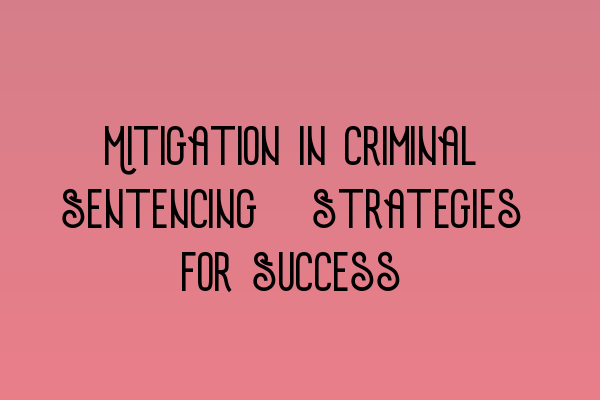Mitigation in Criminal Sentencing: Strategies for Success
Welcome to SQE Criminal Law & Practice Law UK! As leading solicitors in criminal law, we understand the importance of effective mitigation in criminal sentencing. Mitigation plays a crucial role in influencing the court’s decision on the appropriate sentence to be imposed. In this blog post, we will discuss strategies for success in mitigation, providing you with valuable insights to navigate the complexities of criminal sentencing.
What is Mitigation?
Mitigation refers to presenting evidence and arguments to the court in order to secure a more lenient sentence for the defendant. It aims to humanize the defendant and highlight any circumstances that may have led to their involvement in the criminal act. Effective mitigation can make a substantial difference in the outcome of a sentencing hearing.
Key Strategies for Successful Mitigation
1. Thorough Preparation
Preparation is key when it comes to mitigation. As experienced solicitors, we meticulously gather all relevant information about our clients, including their personal background, employment history, educational achievements, and any extenuating circumstances surrounding the offense. This comprehensive approach enables us to present a compelling case for leniency.
2. Collaboration with Experts
In complex cases, collaborating with experts can enhance the effectiveness of your mitigation strategy. Psychologists, social workers, and other professionals can provide valuable insights into the defendant’s mental health, family situation, or addiction issues, which can contribute to a more nuanced understanding of their actions. This depth of analysis can significantly impact the sentence imposed.
3. Tailoring the Mitigation to the Specific Case
Each case is unique, and a successful mitigation strategy must be tailored to the specific circumstances at hand. By thoroughly analyzing the case details and understanding the defendant’s strengths and weaknesses, we can strategically present mitigating factors that resonate with the court.
4. Compelling Narrative and Presentations
Well-crafted narratives can make a powerful impact on the court’s perception of the defendant. Our solicitors are skilled at presenting a compelling story that humanizes the defendant, emphasizing their positive qualities and factors that led to their involvement in the criminal act. This storytelling approach engages the court and encourages leniency.
5. Addressing the Victim’s Perspective
Acknowledging the impact of the offense on the victim and demonstrating genuine remorse is another essential element of successful mitigation. By addressing the victim’s perspective with empathy, we show the court that the defendant understands the consequences of their actions and is committed to personal growth and rehabilitation.
Conclusion
Mitigation strategies play a crucial role in influencing the court’s decision on sentencing in criminal cases. At SQE Criminal Law & Practice Law UK, we understand the intricacies of successful mitigation and employ various strategies to secure the best possible outcome for our clients. Thorough preparation, collaboration with experts, tailored approaches, compelling narratives, and addressing the victim’s perspective are all essential components of a successful mitigation strategy.
If you’re interested in furthering your legal knowledge and preparing for the SQE exams, be sure to check out our related articles:
- SQE 1 Practice Exam Questions
- SQE 1 Practice Mocks FLK1 FLK2
- SQE 2 Preparation Courses
- SQE 1 Preparation Courses
- SRA SQE Exam Dates
Feel free to explore our website for more information on criminal law, practice areas, and our expertise in representing clients in criminal cases.
